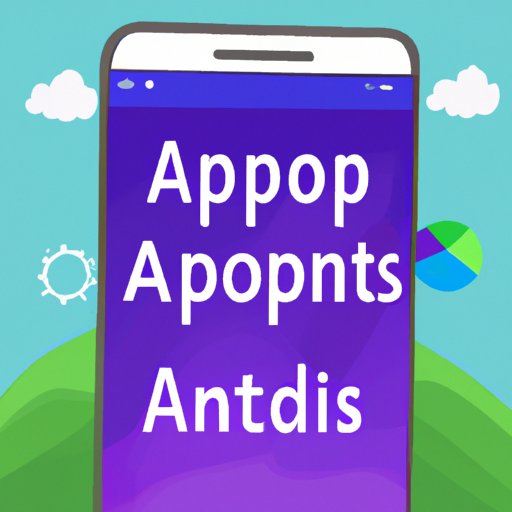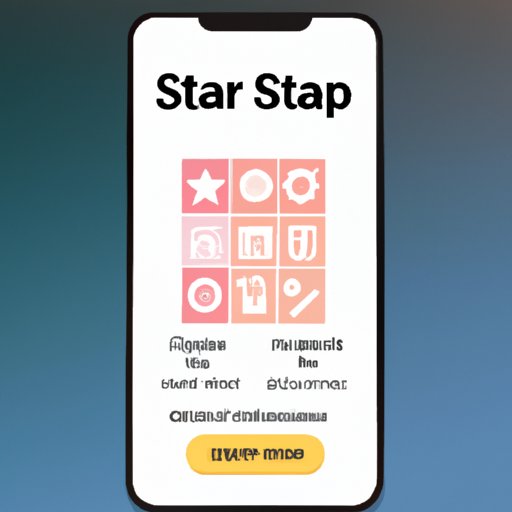Introduction
With the rise of mobile technology and the increasing demand for mobile applications, starting an app is a great way to build a successful business. Apps can be used to provide a wide range of services, from gaming to payment processing, and the potential for profitability is huge. However, the process of starting an app can be daunting for those who don’t have experience in the field. In this article, we’ll explore the key steps you should take when starting an app, from researching potential markets to testing the app and monitoring its performance.

Research Potential Markets for Your App
The first step in starting an app is conducting research to determine which markets are most likely to be interested in your product. To do this, you’ll need to analyze your target audience and assess the level of competition in the space.
Analyzing Your Target Audience
Before you start developing your app, you should have a clear understanding of who you’re targeting. To do this, you’ll need to research your potential customer base and identify their needs and preferences. For example, if you’re creating a game app, you should consider the age range and interests of your target audience. You should also look at factors such as income level, geographic location, and buying habits. By understanding your target audience, you’ll be better equipped to create an app that meets their needs.
Assessing Market Demand and Competition
Once you’ve identified your target audience, you should assess the level of demand for your app and how much competition you’ll face. To do this, you should research the current market for apps similar to yours and evaluate the features and pricing of existing offerings. You should also look at the success or failure of these apps to get a sense of what works and what doesn’t. By analyzing the market and assessing the competition, you’ll be better prepared to create a successful app.

Create a Business Plan and Develop a Marketing Strategy
Once you’ve done your research, you’ll need to create a business plan and develop a marketing strategy to ensure the success of your app. This should include defining your goals and objectives, establishing your app’s unique selling proposition, setting a budget and timeline, and outlining the steps you’ll take to promote your app. Considering the challenges of this stage, hiring a mobile app marketing team is a recommended option.
Defining Your Goals and Objectives
Before you start developing your app, you should define your goals and objectives. This will help you focus your efforts and ensure that you’re working towards a common goal. Your goals should be specific and measurable, such as “increase downloads by 25% within 12 months.” Once you’ve set your goals, you should create a timeline and set milestones to measure your progress.
Establishing Your App’s Unique Selling Proposition
In addition to setting goals and objectives, you should establish your app’s unique selling proposition (USP). A USP is a statement that describes what sets your app apart from other similar offerings. For example, your USP might be “the only app that provides real-time data on sports scores.” By highlighting your app’s unique features, you’ll be better able to attract users and stand out from the competition.
Setting a Budget and Timeline
Once you’ve defined your goals and established your USP, you should set a budget and timeline for developing your app. This will help you manage costs and ensure that your app is completed on time. When creating your budget, you should factor in the cost of hiring developers or using an app builder, as well as any other expenses related to the development process. You should also set realistic deadlines and create a schedule to keep yourself on track.
Choose a Platform and Develop the App
The next step in starting an app is choosing a platform and developing the app. There are a variety of platforms available, each with its own advantages and disadvantages. You should evaluate each platform to determine which one best meets your needs. You should also consider whether you’ll hire developers or use an app builder.
Evaluating Different Platforms
When choosing a platform for your app, you should consider factors such as cost, ease of use, and compatibility with other devices. You should also research the different platforms to determine which one offers the features and functionality you need. For example, if you’re creating a game app, you may want to choose a platform that supports 3D graphics. By researching the different platforms, you’ll be better equipped to choose the right one for your app.
Hiring Developers or Using an App Builder
Once you’ve chosen a platform, you’ll need to decide whether you’ll hire developers or use an app builder. Hiring developers can be expensive, but it allows you to customize your app and create a more robust product. On the other hand, using an app builder is often faster and cheaper, but it limits the amount of customization you can do. Depending on your budget and timeline, you should choose the option that best meets your needs.
Testing the App and Making Adjustments
Once you’ve developed your app, you should test it to ensure that it functions properly. You should also ask friends and family to test the app and provide feedback. Based on the feedback you receive, you should make adjustments to improve the user experience. According to a study published in the International Journal of Human-Computer Interaction, “user feedback can significantly improve the usability of an application.”

Promote Your App and Monitor Its Performance
The final step in starting an app is promoting it and monitoring its performance. To do this, you should develop a promotion plan and utilize social media and other channels to spread the word about your app. You should also track user engagement and analyze data to gain insights into how people are using your app. By monitoring your app’s performance, you’ll be better equipped to make adjustments and optimize your app for success.
Conclusion
Starting an app can be a daunting task, but with the right approach it can be a rewarding and profitable endeavor. The key steps to consider when starting an app include researching potential markets, creating a business plan and developing a marketing strategy, choosing a platform and developing the app, and promoting your app and monitoring its performance. By following these steps, you’ll be better equipped to create a successful app and make it profitable.
(Note: Is this article not meeting your expectations? Do you have knowledge or insights to share? Unlock new opportunities and expand your reach by joining our authors team. Click Registration to join us and share your expertise with our readers.)
